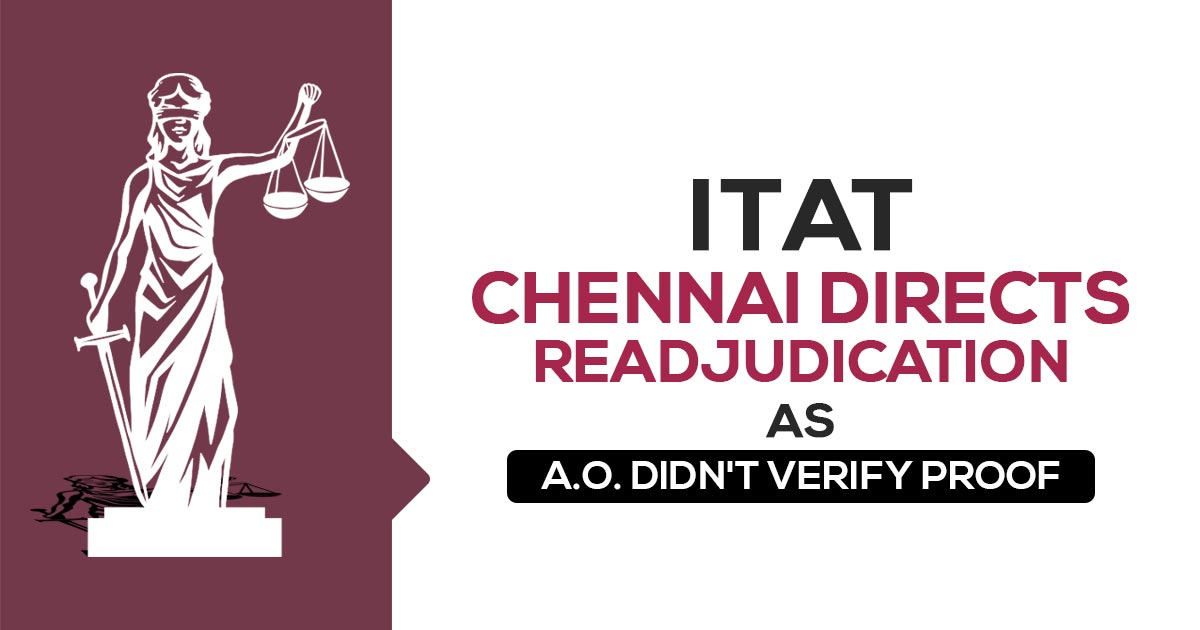
The Income Tax Appellate Tribunal (ITAT), the Chennai bench instructed to adjudicate on the basis of non-verification of further evidence by the Assessing Officer (AO).
The assessee filed ITR (Income Tax Return) for the AY 2015-16 on 30/11/2015 showing NIL income and the loss of ₹.7,87,45,865/- in the current year. The AO observed that the amount demanded by the assessee was ₹.8,59,47,532/- for finance costs for the considered year.
The assessee borrowed funds amounting to ₹.52,10,71,285/- on 31/03/2015. Also, the amount was taken on an interest basis. Additionally, the assessee paid finance costs of ₹8,59,47,532 on incurred interest.
The AO also observed that the assessee had given a sum of ₹15,000,00,000 in advance for the acquisition of land for which an agreement had been made, but no registration had been performed, consequently, the assessee had not yet put the land to use.
The AO also noted that the assessee has taken an interest-free loan naming a fellow subsidiary as an advance to purchase the land. The amount of interest paid in relation to capital borrowed for business or professional purposes shall be permitted as a deduction under Section 36(1)(iii) of the Income Tax Act, 1961.
However, on the grounds of claimed interest on the amount advanced to a fellow subsidiary that is not related to the business of the assessee. So under Section 36(1)(iii), Income Tax Act, 1961, the AO did not approve the sum of ₹.2,47,41,586/-.
The Revenue further appealed, as aggrieved by the decision of the penal. The Revenue claimed in the appeal that the CIT (A) violated Rule 46A of the Income Tax Rules by removing the disapproval made under Section 36(1)(iii) of the Income Tax Act of 1961 without giving the AO an opportunity to authenticate the additional evidence.
The Revenue’s appeal, regarding the deletion of the addition of sum received in advance as its further justification. As of 31/03/2015, the assessee listed a sum of ₹.10,15,70,004/- as advance income under current liabilities.
The AO observed that during the year, the opening & closing stock has not carried out any modification. Additionally, it was observed that the assessee deducted all of its expenses for the year even though the corresponding revenue had not been identified.
The Assessing Officer concluded that the Assessee is not liable to claim to be following the percentage completion method. The assessee was questioned about the same. The Assessing Officer determined that the amount of ₹.10,15,70,004/- was to be added back to the total amount of income reported after carefully examining the assessee’s submissions and thoroughly discussing the observations. According to CIT (A), this situation can not be dealt with under Section 41(1) of the Income Tax Act.
As per the submission of the department representative, CIT(A) removed the addition of received advance income.
Furthermore, it was argued that the assessee had not provided any information regarding billing, the status of the work, or receipts for the Nagai Project and had not explained the concept of matching the assessee’s income of ₹.1.5 crores with its expenses of ₹.17.31 crores. As a result, the AO rightly classified the advance, which had been overdue for more than three years, as the income of the assessee.
Furthermore, the assessee did not provide any documentary evidence in support of its arbitration claim, neither to the Assessing Officer nor to the CIT (A).
The hearing of the case had been fixed for January 31 and February 1 of 2023, but the two bench members, Durga Rao and G. Manjunatha noted that this did not mean that the subject was still pending before the Indian Council of Arbitration had reached its conclusion.
After taking into account the arguments stated before the CIT (A), the tribunal remitted the matter back to the Assessing Officer’s file to be decided afresh under the law.